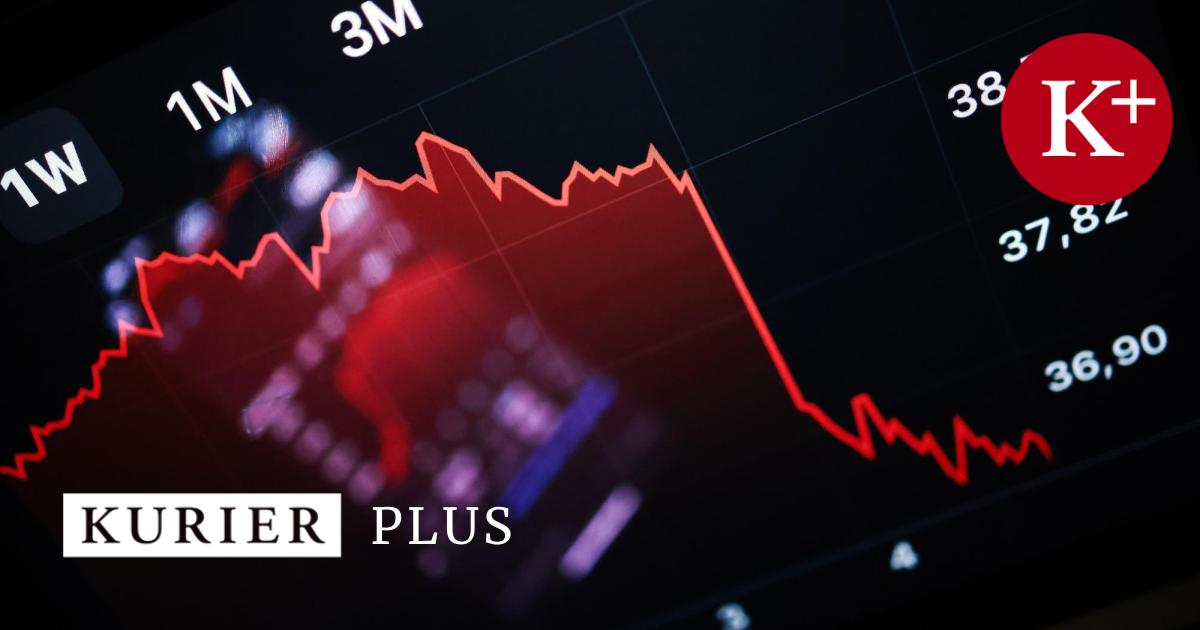US President Trump’s customs policy shakes the stock markets. The courses also crashed worldwide on Monday. How bad are the losses? And what does that mean for investors?
Already on Thursday, the stock markets reacted with significant losses to the introduction of high tariffs on the part of the United States. This development continued on Friday, especially after China also announced further surcharges of 34 percent on goods from the United States, which are due to reach from April 10. And in the self’s key it continued on Monday.
The Vienna leading index ATX gave 3.6 percent until the early afternoon, the Frankfurter Dax 4.3 percent and the London FTSE 100 4.0 percent. The Asian stock exchanges closed deep in the minus before. At the Nikkei index in Tokyo, for example, it was minus 8 percent.
But what does that mean for investors?
1. How bad are the losses on the Vienna Stock Exchange overall?
The win of the entire year (already around 20 percent) has melted away. With the German Dax, the loss is similarly high (however, the dividends are included without it, the image would look worse), as well as the EuroStoxx 50, which depicts the courses of the 50 euro companies, it is minus 5 percent. With Austriacard, Rosenbauer and Vienna Airport, some smaller values are now the most lost, which were spared the worst before the weekend. The papers each handed over between 8.6 and 13 percent. With losses of around six percent, the heavily weighted bank stocks first Group and RBI gave more than the overall market. Weaker growth prospects for lower interest rates had already grown on the financial values in the previous days.
2. Is the sale justified?
Jein. Of course, customs policy affects the global economy and thus also the profits of companies. Institutional investors such as pension funds or fund providers often have legal requirements to meet, i.e. you have to keep certain values when investigating. Therefore, they are forced to sell and are therefore still worsening the location.
For individual investors, however, the question arises whether it makes sense to panicked shares overboard. This is also an individual decision because it depends on the time of purchase. If you have been invested in a title for a long time and want to make cash register for a long time, you can do so. However, the alternatives are currently rare, so it would have to park its free funds (at least short -term) on the money market (cash or bonds). It should also be borne in mind that the courses have increased significantly to record values in recent months, sometimes well beyond their fair reviews, i.e. they were already too expensive.
3. What about gold?
Gold has reached one record after another in the past few weeks and recently broke the $ 3,000 mark. On Friday and Monday, on the other hand, there was a slight loss. In the past 5 days it has been around 2.5 percent. Other raw materials such as natural gas or crude oil continue to lose significantly. The price for a barrel of the Brent variety has fallen to the lowest level since 2021. The retailers assume that demand will also decrease with a weaker global economy. The courses of government bonds, on the other hand, could significantly increase due to the influx of investors.
4. How do you continue on the stock exchanges?
According to the analysts of the Amundi investment house, the trend will be in the coming weeks, provided that there are no significant progress during the negotiations and a new trade agreement is shaped. Market volatility should also remain high in the next few weeks. In the case of currencies, the US dollar, as we have already expected, should remain under pressure, while in the event of a severe deterioration in the economic environment, the yen acts as a safe port. In general, government bonds and gold are recommended, although the latter is very expensive. If stocks, then rather those from Europe or emerging countries. The fund company Pictet, for example, sees more opportunities in the emerging countries than in the industrialized countries. “We are neutral in stocks, bonds and cash, but we are overweighted in emerging countries and shares, including Chinese stocks.” In general, the large tech corporations on Wall Street are more advisable. They have recently had the highest losses.
5. What about inflation?
According to JP Morgan, the risk of stagflation is increasing in the United States – i.e. stagnation of the economy while increasing inflation. Since the United States was hardly as cost-effective as in Asia, the prices for sneakers, clothing or electronics accessories to the dismay of American consumers are likely to attract. On top of that, the restrictions of immigration policy still tightened the situation. The effect could be different for Europe and Austria. Here the consumption mood is not as good as in the United States. Due to the higher tariffs and thus increasing prices and the sales pressure of the manufacturers, in view of the few customers in overseas, demand could decrease, which the bottom line could even press. At WIFO, Austria expects a price level to be 1.1 percent lower. However, the price effects are difficult to predict.
